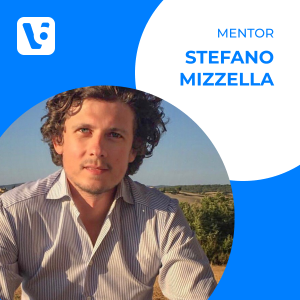“I don’t think the big agency can be agile, sometimes I call them all-you-can-eat agencies”
Meet Stefano Mizzella, an Expert in the mobility field, Business & Innovation Designer and Growth Hacker who is leading volvero’s marketing team to success. Stefano, being an entrepreneur himself, shared with us his experience, and thoughts on the mobility of the future and AI, the hot topic of today.
5 min read
Hi Stefano! You have an impressive experience as a mentor, but you are also an entrepreneur yourself. Can you share with us more about your entrepreneurial journey?
It’s one of the most interesting chapters of my career, it was connected to H-farm. In 2013 I started my first company, it was a digital agency, a little innovation firm called Life Interaction which, in a couple of years, I sold to H-Farm. It was a sort of internal exit. Now that agency is a part of the consulting unit there.
After that, I moved to Europe and the international field. I covered roles as a consultant and business strategy manager being an employee and then, three years later, I decided to start from scratch.
I opened another digital agency which exists today and it is called Absolute Beyond. Absolute Beyond is an innovation firm focused on innovation consulting, digital transformation and experience design and it is based in London, UK and in Italy, as an international branch.
In my career, I always tend to maintain a startup mindset to ideate new projects, and businesses because it’s the best way to apply new trends to make things happen, and try to foster new solutions, new products, and new services.
What is the focus of your agency today?
The agency is a sort of hybrid company because, in my opinion, there’s a sweet spot between the traditional consulting approach and the traditional agency approach. If you want to be relevant for companies, especially for big ones, you have to combine the consulting mindset, be able to research the market, understand the customer’s needs and, at the same time, execute your project in the best way. It works best if you can execute things through a lean-agile approach.
So, our vision is to cover the most relevant trends in the digital transformation field, such as artificial intelligence, metaverse, blockchain and so on. We combine the consulting mindset with the execution of prototyping, testing, discovering, and validating new products or services with the client in an agile way, that’s our vision and mission.
Speaking of being agile, it also means being small in terms of the number of people. So, we are a sort of international digital bureau, a small group of innovators and consultants with an external network of experts and talents that we can activate on specific projects.
So, I don’t think the big agency can be agile, sometimes I call them all-you-can-eat agencies because they try to cover all kinds of services and activities. I don’t trust a lot in that approach, and I prefer to be small, very relevant, and very focused on a few projects.
“ Mobility is one of the most challenging and relevant industries for the future because it impacts our life not only our business… I imagine the future of mobility as a sort of Netflix, where one will have a subscription to different kinds of mobility services“
Are there specific industries in which you prefer to work?
We are open to different industries, but if I have to mention the most important ones, those would be design and fashion and automotive and mobility industries. This is one of the reasons why volvero is such an interesting challenge for me as a mentor.
I think the mobility industry is one of the most interesting challenges in terms of business innovation and customer experience. It has huge potential for very different companies. If you think about it, now energy, and utility companies, are all becoming mobility companies in terms of services and business.
Traditional automotive companies are becoming mobility companies, switching from selling products to new ecosystems of services and so on. So I think mobility is one of the most challenging and relevant industries for the future because it impacts our life not only our business.
Speaking about the mobility industry, it is undergoing a lot of changes nowadays and it is pretty turbulent with constant newcomers, new laws or bans (as in the case of micro-mobility in France), yet the traditional automotive industry is striving, and people do buy cars. So, in your opinion, in what future are we going to arrive eventually? What is going to be a compromise for all?
It is tough to think about the perfect solution because it is a market that does change at the speed of light. It is also a matter of new-coming companies and brand positioning, it’s all the same story when new players, new outliers, come to a new market and change the rules of that market as Uber or Airbnb did a few years ago in their respective industries.
So, it’s difficult to forecast a unique solution, but, in my honest opinion, mobility will be shaped by a new radical solution that will allow us to plan and organize our mobility using smart mobility planners. Because now we have a lot of different kinds of mobile apps and providers able to offer the specific solution if we want to rent an electric bike, or a cab, use public transport or utilize carpooling or car-sharing services.
But I think the most relevant way will be to have a sort of smart mobility planner able to suggest to you the best way to move for leisure or for work and find the best solution not only to be faster but also to be smarter, greener, and more sustainable. It’ll be a mix of different providers or mobility solutions. It will be tricky to connect different kinds of players and brands to mix their services, like software APIs, but in the mobility of the future, I see connected ecosystems tailored to the needs of users.
That makes sense. Nowadays we want everything predicted, fast, and accessible from our smartphone but at the same time extremely user-friendly and with a great variety to choose from.
Yes, I imagine the future of mobility as a sort of Netflix, where one will have a subscription to different kinds of mobility services, and they won’t need to purchase anything more because, with a unique subscription, they will be able to start using different kinds of services.
Obviously, it’s not easy because we would have to balance the assets within an open and integrated ecosystem able to connect different players and technologies, like the traditional APIs.
Netflix for mobility? That would be so convenient! I am subscribing. Stepping back to mentorship, what are the common problems of companies you work with, is there any pattern you see?
This is a crucial question because I notice some common patterns and generic mistakes made by companies, especially big ones. For instance, the lack of understanding of the concrete user needs. Sometimes a company wants to sell something without a concrete understanding of the real needs of the customers. And this is a crucial part because if you are not focused on the value proposition of your product or service, or your real competitive advantage, it’s not easy to understand your market fit.
Another mistake is to waste a lot of time, energy, and money on traditional waterfall product development. So, you spend all of this on creating something and when you are ready to go to market, the needs of your customers have changed. The standard of the market has changed because other competitors and other startups appeared in the meantime.
So, the possibility to really understand the user needs, the possibility to define a concrete value proposition, and the possibility to start the faster you can with a proof of concept and a prototype, with a minimum viable product to test, validate and iterate it for the progressive improvements, could be the best way to be smart, to be faster, and to be relevant in the industry.
” AI will be an invisible layer able to connect all aspects of our life and obviously, this is a huge opportunity and risk because it is probably the first technology in human history able to make humans have less power.“
My last question would be about the topic you work on. It has been everywhere lately, so I must ask what’s your opinion about AI tools? Do you support this industry?
Yes, absolutely, I love to experiment, to test new tools and technologies. AI is really a change-maker. Before I mentioned other trends, like the metaverse and the blockchain which are for sure important innovations, but the impact that AI will have or, better, is having on our life and any aspect of our existence is huge.
AI will be an invisible layer able to connect all aspects of our life and obviously, this is a huge opportunity and risk because it is probably the first technology in human history able to make humans have less power. With AI we transfer a lot of power to the machine. Like in a black mirror scenario. But I see this revolution in a positive way if we are able to manage this big opportunity by maintaining our focus on the most relevant activities for our growth and using artificial intelligence to automate micro activities which are not so relevant for our growth. So, I’m very optimistic about this kind of technology. I use a lot of Chat GPT, Midjourney and other tools to create content, but I always put something more on top of the outcome, but I think it’s a good starting point to be faster and to be smarter.
I absolutely agree with you. If we leverage it well, it has great potential and can bring positive change. Thank you Stefano for taking the time to chat with us!
Ekaterina Efimova @volvero




